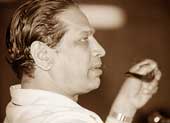|
|
Memoirs of a Rationalist
By Vasant Sathe,
Stellar, Rs 495
Vasant Sathe belongs to that dwindling breed of politicians who have a taste for arts and culture. Couched in a breezy style, Sathe?s memoirs narrates several significant facts and experiences of his life. During World War II, at the national conference of the Student?s Federation of India, Sathe had vehemently opposed a resolution which called upon Indians to condemn Subhas Bose and his INA which was advancing towards India. Sathe also reveals in detail how his earnest efforts to join Netaji and his army failed.
Starting off as a lawyer, Sathe switched to politics at the insistence of Indira Gandhi who wanted to utilize his services for the Congress party. Shortly after, Mrs Gandhi nominated him as a member of the Indian delegation to the UN general assembly. Indira Gandhi also requested Sathe to contest the Lok Sabha seat for Akola, which he won with a massive margin of 180,000 votes. Sathe?s parliamentary career thus took off majestically.
In his maiden speech in the Lok Sabha, Sathe won hearts by pleading for the grant of pensions to freedom fighters. He even criticized the then finance minister, Y B. Chavan, for not having taken care of the poor. With such a tirade coming from a completely new member, the Congress benches were astounded. But he was warmly applauded by both the Congress and the opposition, a rare achievement indeed.
?Given my socialist leanings, I was also involved in the World Peace Council, a left-oriented International body, well supported by the Soviet Union and many other East European and African countries?, says Sathe. He was soon taken on the privileges committee and the consultative committee of the planning commission. Sathe was also an active member of the Congress Socialist Forum in parliament. He was appointed president of ICCR, a unique honour. His keen interest in cultural activities earned him the post of parliamentary cultural secretary.
For all his liberal outlook, however, Sathe defended the Emergency. Although his mentor lost the elections that followed the lifting of the Emergency, Sathe, in spite of the prevailing anti-Congressism, won by a margin of over 8,000 votes.
Sathe writes, ?In my entire service of ten years as a minister, having handed different portfolios, I have had the best of relations with my secretaries and various officials dealing with different departments.? Sathe?s progressive outlook was borne out by his observations on India?s language policy. He pointed out that ?although in the long run Hindi alone could become the common language of the entire nation, it must be allowed to grow voluntarily from the stage of primary education upwards and irrespective of what time it may take, this language should never be imposed on the non-speaking states.?
Not many parliamentarians made their presence felt the way Sathe did. Reflecting on the economic situation in 1975, he proposed that at the grassroots level, the villages should become economically self-reliant as in the past. He also went on to suggest ways for a better and efficient distribution of foodgrains and other agricultural product.
In the penultimate chapter in this book Sathe pays his tribute to Gandhi. ?The most worthwhile facet of this great strength led by a frail person...was the tremendous spiritual influence of non- violence.?











